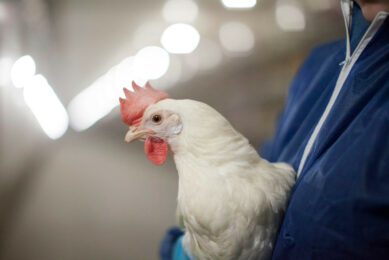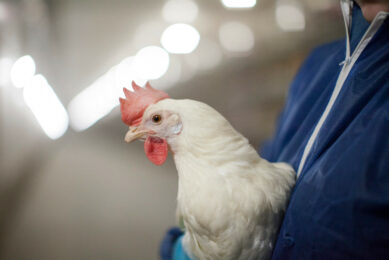Alltech concludes solutions seminars in Hannover, Germany
After hosting the Poultry Solutions Seminar in Ireland recently, animal feed and nutrition company Alltech presented its Pig and Ruminant Solutions Seminars in Hannover, Germany on Monday, November 15th.
With discussions by ten leading dairy and pig veterinarians, nutritionists and scientific researchers, attendees were given practical insights into their respective sectors and solutions to some of the challenges their industries face today.
Alltech Solutions Deployment Team Manager, Dr. Jules Taylor-Pickard opened the Pig Solutions Seminar, stating that “European pig production represents 25% of global pig production but we have one of the highest costs of production globally. As an industry, we need to focus on improving production efficiency and costs. This seminar will address these issues.”
Dr. Fabio Catunda, Latin American Swine Manager, Alltech Brazil, addressed the topic of protein in the diets of piglets and outlined how cost, availability and market regulation determine the choice of protein supplements available for inclusion in piglet diets. Dr. Catunda explored one protein source in particular, recommending “The use of a yeast extract, Nupro® which has proven to be a viable alternative for piglet diets as it improves feed intake and performance.”
Dr. Gretchen Myers Hill, Michigan State University, USA, explored the subject of new developments in the field of mineral nutrition for pigs. A specialist in the mechanisms of zinc, copper and iron metabolism, she commented that “We need to look at mineral bioavailability as regulatory responses that the pig uses to maintain optimal homeostasis – it is not stored in the bones or liver. Genetics will influence the animal’s needs as well as the age and physiological state.”
Dr. Karl Dawson, Director of Worldwide Research at Alltech, discussed the role of continued research and development in science and evaluated the possibilities that will have to be explored by feed nutritionists in the next decade as the potential of nutrigenomics and other technologies are unlocked.
Closing the Pig Solutions Seminar, Mr. Pepe Roquet of Alltech Spain addressed attendees with some of the current perspectives on the European pig industry and reiterated the need to face challenges with new opportunities and innovations, but in ways that maintain animal health and welfare and environmental safety. He said, “Consumers are entitled to safe, healthy and traceable meat at an affordable price. To achieve this efficiency is a must and this efficiency must be reached through the use of feeds and supplements.”
Running in tandem with the Pig seminar was Alltech’s Ruminant Solutions Seminar, also taking place in Hannover, Germany. Boasting key figures from the sector, attendees were greeted by Alltech Techincal Manger for Ruminants, Sylvie Andrieu who said that, “With rising feed costs and increasing pressure on product quality and safety, the ruminant industry needs to utilise every aspect of production efficiency and look to maximising use of existing, as well as new technologies. This seminar will provide a great opportunity for leaders in the field to share information and ideas on how best to achieve these goals.”
Running in tandem with the Pig seminar was Alltech’s Ruminant Solutions Seminar, also taking place in Hannover, Germany. Boasting key figures from the sector, attendees were greeted by Alltech Techincal Manger for Ruminants, Sylvie Andrieu who said that, “With rising feed costs and increasing pressure on product quality and safety, the ruminant industry needs to utilise every aspect of production efficiency and look to maximising use of existing, as well as new technologies. This seminar will provide a great opportunity for leaders in the field to share information and ideas on how best to achieve these goals.”
Prof. Mike Hutjens from the University of Illinois spoke about challenges to the American dairy sector and what lessons the European industry could learn from experiences there. Recommending a number of innovative feeding strategies, Dr. Hutjens commented, “Nutrient recommendations will be the same when milk prices are high and low. Short term nutrient reductions will lead to longer term economic losses in milk productivity, fertility and health (immunity).”
Mr. Martin Kavannagh of Cow Solutions Consulting, Ireland, posed the question, “Feeding the dairy cow – how do you know you are getting value for money?”. His talk centred on the application of modern, sophisticated means of measuring cow performance and evaluating the generation of income from this when compared with the particular nutrition strategy used by the producer.
Dr. Cat Berge, of Berge Veterinary Consulting, Belgium addressed delegates at the seminar about the importance of maintaining heifer health in order to maximise productivity of the animal later in its life. Exploring a number of topics related to colostrum, calf nutrition and combating disease in calves, Dr. Berge stressed that “The feeding of colostrum in the first hours of life of the calf and the quantity and quality of the milk replacer fed thereafter may impact milk production by several hundred litres per lactation.”
Dr. Dave Davies, Silage Solutions Ltd., UK, opened his discussion with a brief history of silage making and the recent development of technologies used to turn silage into an effective feed option in dairy cow nutrition. Though the quality of silage has improved dramatically due, future developments in silage compositional analysis and ration formulation are required to maximise the power of these feedstuff.
Closing the Ruminant Solutions Seminar was Alltech’s Dr. Richard Murphy, Research coordinator at Alltech’s European Bioscience Centre in Ireland. Dr. Murphy pointed out that “Despite the confusion and often contradictory information that exists about organic trace elements and minerals, by carefully considering factors important in organic mineral production one can begin to distinguish between the products on the basis of biological stability and thus biological bioavailability.”











